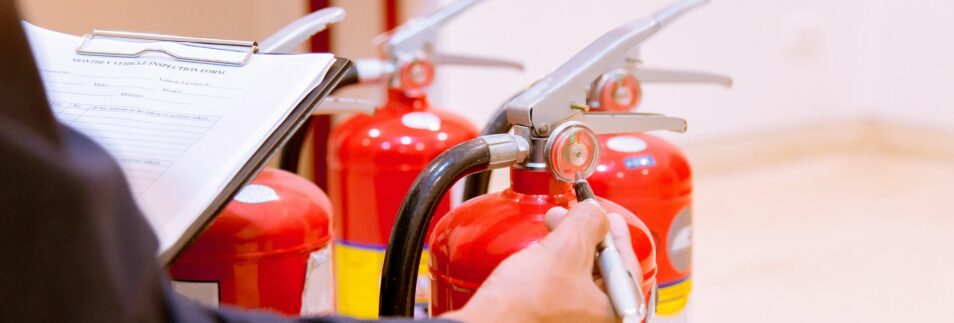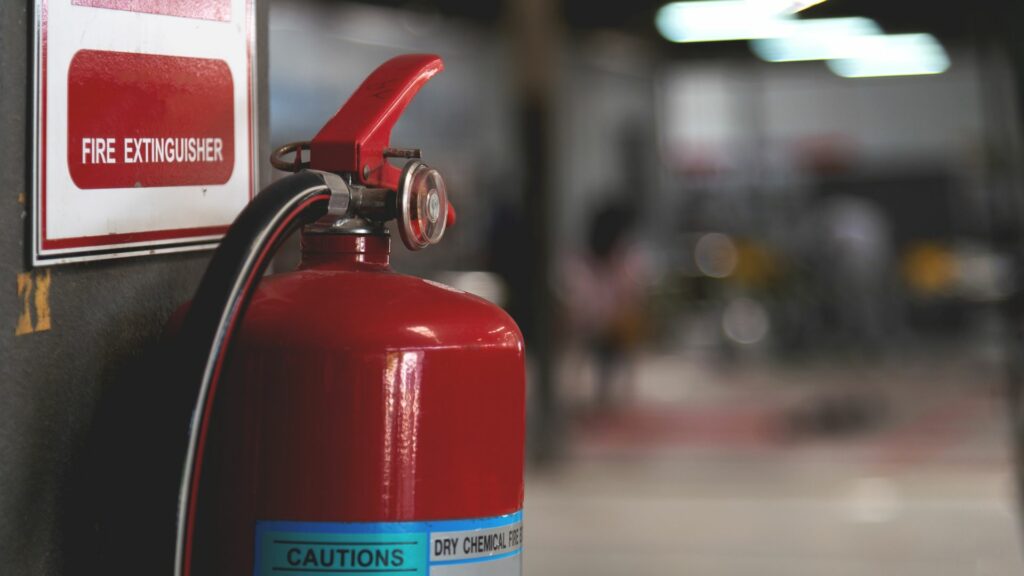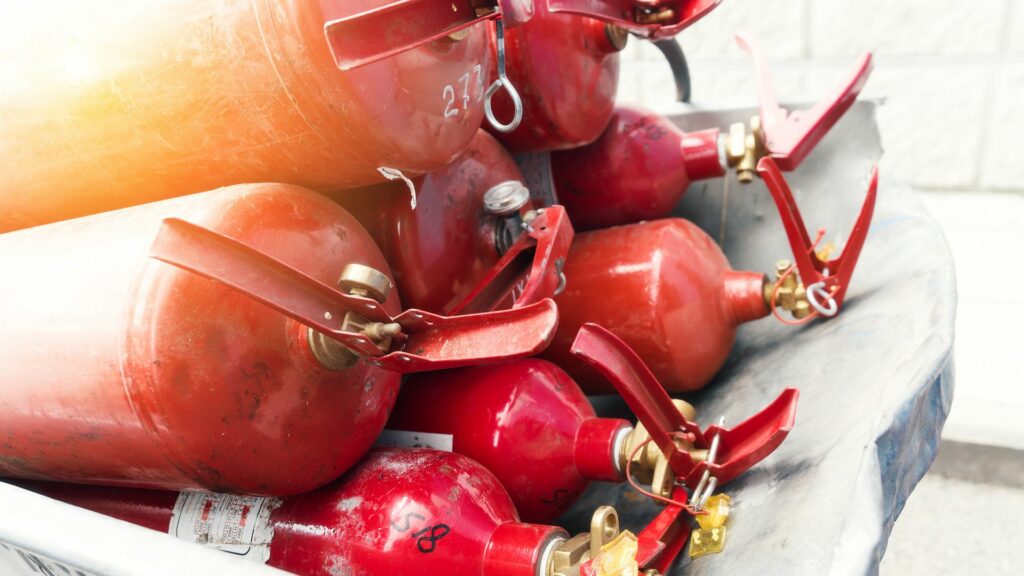Safety And Sustainability: How To Handle Fire Extinguisher Disposal

Disposing of old or used fire extinguishers can be a puzzle for many commercial property and facility managers in Maryland. One key fact to remember is that these units cannot simply be tossed into the trash due to their hazardous contents.
Our article aims to guide you through the correct steps for fire extinguisher disposal, ensuring safety and sustainability. Engage with us as we navigate this important task together—read on for essential insights.
Key Takeaways
- Fire extinguishers contain harmful chemicals and pressurized gases that can damage the environment if not disposed of correctly. It’s important to follow safe disposal methods to prevent soil and water pollution.
- Local fire departments, hazardous waste facilities, recycling centers, and professional waste removal services provide safe options for disposing of old or used fire extinguishers. These ensure the materials are handled properly without harming people or nature.
- Regular maintenance checks on fire extinguishers help identify damage or expiration early. This keeps them ready for emergencies and extends their lifespan, reducing the need for premature disposal.
- Storing fire extinguishers in a cool, dry place prevents damage from humidity or temperature extremes. Training employees on proper use can avoid unnecessary discharges that lead to additional maintenance or replacement needs.
- Participating in special collection days for recyclable materials allows businesses to dispose of empty fire extinguishers responsibly while contributing to environmental sustainability efforts.
Why Proper Disposal of Fire Extinguishers is Important

Throwing fire extinguishers in regular trash poses serious risks. The hazardous materials inside can contaminate the environment, making safe disposal crucial.
Fire extinguishers cannot be thrown away in regular trash
Fire extinguishers play a crucial role in ensuring safety, but their disposal requires special attention due to the hazardous chemicals and pressurized components they contain. Disposing of these devices in regular trash could result in harmful substances leaking into soil and groundwater, posing significant environmental and public health risks.
Consequently, commercial property managers and facility managers must adopt responsible waste management practices to prevent such outcomes.
Safe handling begins with recognizing that fire extinguisher disposal goes beyond simply tossing it into garbage bins. These units often hold chemicals like ammonium phosphate or pressurized gases that can become perilous if not managed correctly.
Landfills are ill-equipped to handle such materials safely, which underscores the importance of seeking alternative disposal methods that align with environmental protection standards.
For those managing properties in Maryland, understanding this aspect of waste disposal is integral to both compliance and sustainability efforts.
Hazardous materials inside can harm the environment
Fire extinguishers play a crucial role in ensuring safety, but they can turn into environmental hazards if not disposed of correctly. These devices contain chemicals, pressurized gases such as chlorofluorocarbons (CFCs), and other toxic substances that pose serious risks to the environment.
If thrown out carelessly, these materials can leak into the soil and waterways, polluting them and harming wildlife. The release of CFCs into the atmosphere also contributes to ozone layer depletion.
Managing this waste responsibly requires awareness and action from commercial property managers and facility managers in Maryland. By choosing safe disposal options like hazardous waste facilities or specialized recycling centers, you help prevent pollution.
This not only protects ecosystems but also aligns with sustainability goals by promoting scrap metal recycling and proper management of chemical waste. Making informed decisions about fire extinguisher disposal is a step towards reducing your property’s environmental footprint while ensuring compliance with regulations on e-waste and hazardous materials management.
Safe Disposal Options for Fire Extinguishers

Removing fire extinguishers safely ensures that harmful chemicals do not damage our environment. Several effective methods exist to dispose of these essential safety devices without risking harm to nature or people.
Contact the fire department for proper disposal
Reach out to your local fire department for an environmentally safe and regulatory-compliant way to dispose of old or used fire extinguishers. Fire departments are well-versed in handling hazardous materials and can ensure that the disposal process meets all safety guidelines.
This step not only protects the environment but also keeps your property management practices in line with legal requirements.
The fire department can guide you through the proper channels for disposal, making sure that substances like baking soda or monoammonium phosphate found in some extinguishers don’t pose a threat to the ecosystem.
By choosing this route, you contribute to a safer community and a cleaner environment, showcasing responsible management of commercial properties.
Take it to a hazardous waste disposal facility
Taking your used fire extinguishers to a hazardous waste disposal facility is one of the most reliable methods for ensuring their safe removal. These facilities are specifically equipped to handle materials like the ones found in fire extinguishers, mitigating any harm to the environment or public health.
By choosing this route, commercial property and facility managers in Maryland play a crucial role in promoting sustainability and safety within their communities.
Hazardous waste disposal facilities offer specialized services that are essential for dealing with potentially dangerous items. They follow strict guidelines to ensure that everything they receive, including fire extinguishers, propane tanks, compact fluorescent light bulbs, and batteries, is processed correctly.
This method not only helps keep harmful chemicals out of landfills but also aligns with responsible waste management practices vital for maintaining eco-friendly operations.
Hire a waste removal professional
Hiring a waste removal professional ensures the proper disposal of fire extinguishers, promoting both environmental sustainability and safety. This approach aligns with Castle Sprinkler and Alarm’s commitment to prioritizing customer interests in Maryland.
These experts understand the complexities involved in disposing hazardous materials like those found inside fire extinguishers. They use specialized equipment and follow strict regulations to prevent harm to the environment and people.
Opting for expert junk removal services for items such as cylinders, automotive batteries, or even medical waste presents a reliable shortcut to compliance with disposal laws. Waste removal professionals have extensive knowledge about recycling centers equipped to handle complex materials like lithium-ion batteries or propane gas tanks safely.
Their experience ensures that these potentially dangerous items are treated responsibly, reducing risks associated with improper handling and supporting environmental preservation efforts without adding extra work for commercial property managers and facility managers.
Bring it to a dedicated recycling center
Transitioning from hiring a waste removal professional, another effective method to ensure eco-friendly disposal of fire extinguishers is by bringing them to a dedicated recycling center.
These specialized facilities have the necessary expertise and equipment to handle hazardous materials safely, thus safeguarding both environmental health and public safety.
Dedicated recycling centers not only process fire extinguishers in an environmentally friendly manner but also contribute significantly towards sustainable waste management practices.
By choosing this disposal route, commercial property managers and facility managers in Maryland play a crucial role in promoting a cleaner and safer environment for future generations.
Leave it out for recycling
Transitioning from bringing fire extinguishers to a recycling center, another option exists for commercial property and facility managers in Maryland. You can leave out fire extinguishers specifically marked for recycling during special collection days.
Cities often host these events to gather materials like electronics, alkaline and lithium-ion batteries, lighting fixtures, and more in an effort to promote environmental sustainability.
Ensure the fire extinguisher is emptied before setting it out for collection. This step helps protect sanitation workers from potential hazards while ensuring that valuable materials such as chrome and metal parts are recovered efficiently.
Local waste management authorities or the Department of Sanitation websites offer schedules and guidelines on how to prepare items for these recycling drives, making it easy for businesses to participate in eco-friendly disposal practices.
Maintaining and Replacing Fire Extinguishers
Keeping fire extinguishers in top condition is crucial for safety and efficiency. Regular checks help identify signs of damage or expiration, ensuring they work correctly when needed most.
Signs of damage or expiration
Ensuring the safety and efficiency of fire extinguishers within commercial properties requires regular inspection for damage or expiration. Commercial Property Managers and Facility Managers in Maryland play a crucial role in this process, keeping their buildings safe and compliant with regulations.
- Inspect for Dents or Rust: Fire extinguishers exposed to harsh conditions or neglect often show external signs of wear, such as dents, rust, or corrosion. These indicators compromise the integrity of the cylinder, potentially affecting its operation during emergencies.
- Check the Pressure Gauge: A pressure gauge reading outside the green zone signals an issue—either over-pressurization or leakage. Both scenarios indicate that the fire extinguisher may not function correctly when needed.
- Look for Tampering: Unauthorized use or tampering can impact a fire extinguisher’s effectiveness. Seals or tamper indicators broken without proper documentation suggest it might have been used, requiring immediate inspection or replacement.
- Verify Expiration Date: Fire extinguishers have a shelf life, making regular checks for expiration dates essential. Using an expired fire extinguisher can be dangerous and is less likely to work effectively in quelling a fire.
- Assess Hose and Nozzle Condition: Ensure that the hose and nozzle are intact and free from obstruction or damage. Cracks, leaks, or blockages can prevent a fire extinguisher from performing optimally.
Proper maintenance involves more than just periodic inspections; it also includes knowing when to replace units that no longer meet safety standards. Transitioning smoothly into considerations for maintaining and replacing fire extinguishers ensures these critical safety tools remain ready at all times.
Proper ways to maintain and store fire extinguishers
Understanding the signs of damage or expiration in fire extinguishers is critical, but equally important is knowledge about their proper maintenance and storage. These practices ensure that your fire extinguishers remain reliable and effective, safeguarding your commercial property in Maryland.
Here are essential tips for maintaining and storing fire extinguishers:
- Regular checks are a must. Schedule monthly inspections to look for signs of physical damage, corrosion, or leakage. Ensure the pressure gauge shows a full charge and that the pin and tamper seal are intact.
- Store them correctly. Fire extinguishers should be placed in a cool, dry area to prevent any damage from humidity or temperature extremes. This keeps them ready for use at all times.
- Train employees on proper use. Knowledge about how to operate fire extinguishers not only boosts safety but also helps in preventing unnecessary discharges that can result in needless refills or maintenance checks.
- Recharge after use. Even if you’ve only used it briefly, get the fire extinguisher recharged immediately to ensure it’s ready for the next emergency.
- Keep accessible yet secure locations chosen for storage must be easily visible and reachable by everyone on the premises while avoiding areas prone to accidental damage or tampering.
- Inventory management plays a crucial role too. Maintain clear records of purchase dates, maintenance schedules, and inspection outcomes to manage replacements smoothly before they reach their best-by date.
- Follow manufacturer’s guidelines closely for specific care instructions related to different types of extinguishers such as water-based, carbon dioxide, or powder.
- Proper signage should point out where fire extinguishers are located throughout your facility ensuring even visitors can find them during an emergency without confusion.
- Recycle old units responsibly by contacting battery recycling centers or specialized facilities capable of handling items like lithium-ion batteries often found in newer fire extinguisher models.
- Lastly, adhere to local regulations which may have specific requirements for inspection frequencies, documentation, and disposal methods ensuring legal compliance alongside practical safety measures.
Frequently Asked Questions
Curious minds often ask how to extend the life of their fire extinguishers or the best way to dispose of them safely. We cover these essential queries, offering expert guidance on keeping your premises safe and environmentally friendly.
How long are fire extinguishers good for?
Fire extinguishers play a critical role in ensuring safety within commercial properties, with their effectiveness spanning between 10 to 12 years. Regular checks on the pressure gauge are essential to maintain them in optimal working condition.
This operational range is crucial for property and facility managers in Maryland to monitor, as it directly impacts the extinguisher’s ability to function properly during emergencies.
Knowing the lifespan of fire extinguishers helps managers plan for replacements and ensures that they adhere to safety regulations. Having an effective maintenance schedule prevents unexpected failures and keeps buildings compliant with state safety standards.
Keeping track of this timeline also aids in budgeting for new equipment, guaranteeing that properties are equipped with functional firefighting tools at all times.
How to dispose of a powder fire extinguisher?
Moving from understanding the lifespan of fire extinguishers to addressing their disposal, it’s crucial for property and facility managers in Maryland to know the correct steps for powder fire extinguisher disposal.
First, ensure that the extinguisher is fully discharged to empty it of monoammonium phosphate, a chemical harmful to the environment if not disposed of properly. This step is key before considering disposal options.
Once emptied, you have several safe avenues for disposing of your powder fire extinguisher. You can take it to a hazardous waste disposal facility dedicated to handling such materials responsibly.
Alternatively, some local fire departments provide disposal services specifically for these types of extinguishers. Engaging a professional fire protection company can also offer guidance and assistance in this process, ensuring that no rules are breached and environmental safety is maintained.
Remembering never to throw these extinguishers into regular trash bins is essential; doing so poses risks not only to sanitation workers but also impacts environmental health significantly.
How to neutralize monoammonium phosphate?
After discussing how to dispose of a powder fire extinguisher, it’s essential to address the neutralization of monoammonium phosphate. This chemical requires careful handling due to its potential environmental impact.
To neutralize monoammonium phosphate, start by mixing it with a significant amount of water. This process dilutes the compound, making it safer for disposal.
Ensure you wear protective gear and work in an area that is well-ventilated during this procedure. Following dilution, the neutralized substance can be disposed of in compliance with local hazardous waste regulations.
Paying attention to these guidelines helps protect your facility and supports sustainability efforts in Maryland.
Conclusion
Handling the disposal of fire extinguishers carefully not only ensures safety but also promotes sustainability. By contacting fire departments, utilizing hazardous waste facilities, or engaging with recycling centers, you find practical ways to manage these items responsibly.
Every small step taken in this direction has a significant impact on our environment and community well-being. To deepen understanding or get more involved, exploring resources from professional fire protection companies can be invaluable.
“The future is not something we enter; the future is something we create” – taking action today in disposing of fire extinguishers properly shapes a safer, greener tomorrow for everyone.
FAQs
1. Why is it important to dispose of fire extinguishers properly?
Disposing of fire extinguishers correctly ensures safety and sustainability. Incorrect disposal can lead to pollution, injury, or even fires if the contents are under pressure or contain hazardous materials like acetylene.
2. Can fire extinguishers be recycled?
Yes, many parts of a fire extinguisher, such as metal components, can be recycled. However, they must first be emptied and the pressure released by professionals before recycling to prevent accidents.
3. What should I do with an old fire extinguisher that still has pressure?
Never throw away a pressurized fire extinguisher in the trash. Take it to a local hazardous waste facility or contact your local fire department for advice on safe disposal options.
4. Are there any parts of a fire extinguisher that cannot be recycled?
Some components might not be recyclable due to contamination with chemicals or because they are made from materials that are difficult to process for reuse. Always check with your local recycling center for specific guidelines.
5. How can I ensure my old fire extinguisher doesn’t harm the environment when disposing of it?
Take your old fire extinguisher to facilities equipped to handle hazardous materials safely or participate in programs designed for electronics recycling where batteries and other potentially dangerous items like lithium-ion battery fires are managed responsibly.
